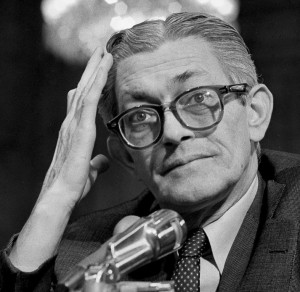Last summer I paid a visit to Georgetown University’s Lauinger Library as part of my research on legendary CIA counterspy James Jesus Angleton. I went there to investigate Angleton’s famous mole hunt, one of the least flattering episodes of his eventful career. By the early 1960s, Angleton was convinced the KGB had managed to insert a penetration agent high in the ranks of the CIA.
In researching and writing a biography of Angleton, I constantly confront a conundrum: Was the man utterly brilliant? Or completely nuts?
Angleton is one of America’s archetypal spies. He was the model for Harlot in Harlot’s Ghost, Norman Mailer’s epic of the CIA, a brooding Cold War spirit hovering over a story of corrupted idealism. In Robert De Niro’s cinematic telling of the tale, The Good Shepherd, the Angletonian character was a promising product of the system who loses his way in the moral labyrinth of secret intelligence operations.
In real life, Jim Angleton was a formidable intellectual and canny bureaucrat who helped shape the ethos of the Central Intelligence Agency we have today. His doctrine of counterintelligence was widely influential, not only in the CIA but in the intelligence services of all the English-speaking countries. He pioneered pre-digital techniques of mass surveillance via an illicit mail-opening program called LINGUAL. He fed the intel to J. Edgar Hoover’s COINTELPRO operatives at the FBI who used it to harass, disrupt, and discredit leftist, antiwar, and civil rights groups from the 1950s to the 1970s. His close liaison with the Mossad in the 1950s and 1960s helped forge a wide-ranging U.S.-Israel strategic relationship that has been central to U.S. foreign policy ever since.
Like them or not, his accomplishments were large. So were his mistakes.
Angleton’s fruitless mole hunt paralyzed the agency’s operations in the Soviet Union in the late 1960s. Speaking in 2012 at a conference on Angleton’s legacy, historian Christopher Andrew offered a nuanced view on the agency’s notorious mole hunter. “When somebody as bright, as distinguished, and so capable of friendship as Jim Angleton makes these sort of appalling errors that he does,” Andrew said, “then we are faced with one of the greatest personal tragedies in the modern history of U.S. and British intelligence.”
Yet no historian can give short shrift to the man whom the Daily Beast recently dubbed “The Spider.” Angleton, who died in 1987, was a master of Cold War power politics, and a seer of the coming U.S. surveillance state. His charisma gained him the confidence of several famous poets, a future pope, four Mossad chiefs, a presidential mistress, a couple of Mafiosos, the odd New York intellectual, and a global network of like-minded spooks.
Whatever his faults, Angleton acted zealously on a theory of history whose validity is hard to accept and hard to dispute. He believed that secret intelligence agencies controlled the destiny of mankind. During his 27-year career at the CIA, from 1947 to 1974, he acted as if the CIA and the KGB were struggling over the future of civilization itself — which, of course, they were.
The Cold War is over and Angleton is gone, but the espionage techniques he mastered — mass surveillance, disinformation, targeted assassination, and extrajudicial detention — remain with us, albeit on a much larger scale. Since September 11, 2001, the power of secret intelligence agencies to shape our future is obvious.
Yet it wasn’t until I went to Georgetown in search of one of Angleton’s darkest secrets that I came away with a personal lesson in how the CIA makes history — by erasing it.
CONTINUE READING AT THEINTERCEPT.COM

